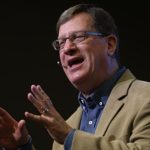Posted 6/30/03
Leonard: Baptists 'bog down'
relating to people of other faiths
By Marv Knox
Editor
CHARLOTTE, N.C.–Many Baptists bog down in theological "quicksand" as they try to relate to people of other religions, church historian Bill Leonard reported.
They’ve got "one foot set in Jesus-ism and the other in pluralism," Leonard said in a breakout session held during the Cooperative Baptist Fellowship’s general assembly.
But by taking clues from their heritage, Baptists can find firm footing to remain respectful while advocating for their cause, said Leonard, dean of Wake Forest University’s Divinity School.
"Since the beginning of our movement, Baptists generally have affirmed the belief in a regenerate church membership or believer’s church," he said. "Conversion to Christ is non-negotiable" for salvation and membership in the church.
"But since almost the beginning, Baptists have not agreed on the nature or process of that conversion," he noted.
As early as 1608-09, Baptists affirmed the thinking of religious reformer Jacob Arminius, who believed all people have free will and can decide if they will accept God’s grace in Christ and be saved.
Less than 30 years later, Baptists influenced by reformer John Calvin believed Christ died only for the "elect," or those God already had chosen to be saved, he said.
Sign up for our weekly edition and get all our headlines in your inbox on Thursdays
In Calvinism, "some are elect, some damned," Leonard explained, adding this understanding implied individuals play no significant part in salvation. "If you are elect, God’s irresistible grace will find you anyway."
So, almost from the beginning of their history, Baptists affirmed two unique plans for salvation, he said.
Moreover, Baptists developed the concept of religious pluralism in America, he added. They took their cues from English Baptists, who first said God, not government, is the Lord of conscience, and neither the church nor the state can dictate religious faith.
Led by Roger Williams, founder of Rhode Island Colony, Baptists in America advocated for pluralism, the notion that "every individual is free to believe the right stuff, the wrong stuff or nothing at all," Leonard said.
But even as they championed the rights of others, Baptists advocated for their own beliefs, he noted.
"Baptists were not silent about the need for regeneration," he observed. "Baptists said, ‘You’re free to believe, but we’re free to tell you you’re wrong.’"
This principle of religious pluralism is in serious danger today, Leonard warned. "It is half a step from saying all other religions are wrong to saying we have to protect ‘the innocent’ with sanctions" against other religions, he explained. "The Baptists (who were persecuted for their faith in Colonial America) knew that before everybody else."
Throughout the generations, most Baptists have struggled to live in two worlds–unashamed commitment to Christian religion and an understanding of religious liberty that nurtured pluralism, he said.
These potentially competing values create the "quicksand" that provides uncertain footing for evangelistic Christians who also affirm others’ rights, he noted.
Up until the late 18th century, when Calvinistic thinking prevailed among Baptists, the challenge between "Jesus-ism" and pluralism wasn’t significant, Leonard said. Since God would save whomever God chose to save, Baptists were not threatened by pluralism or compelled to confront other faiths. That was God’s issue, not theirs.
But when Baptists began to engage in world missions after 1792, they had to consider God’s purposes and their interaction with other religions, he noted.
"If you have a responsibility to say Jesus is the only Savior of the world, you have to deal with other religions in ways you didn’t when Calvinistic theology was in place."
Consequently, world missions and evangelism opened the door for dialogue with other religions and the sensitive issue of competing truth claims.
Often, some critics attack Christianity on this point, claiming Christians try to exert "salvific hegemony" over others, Leonard observed. However, other religions–particularly Islam–often are more extreme in denying Christians the opportunity to express their faith.
"Every religion has the right to propagate and promote its world views," he said. That’s just as true for Christians as it is for Jews, Muslims, Buddhists and others.
In fact, the way out of the "quicksand," he said, is recognizing Christians can live responsibly and effectively in a pluralistic society without forfeiting their beliefs or abandoning the right to express them to people who believe differently.
In recent years, many Christians have feared pluralism because they have confused it with syncretism, a politically correct blending of various beliefs that waters each of them down and neutralizes them.
"Pluralism is not capitulation to syncretism," Leonard said. "I’ve seen students confusing pluralism with syncretism,. They hesitate to speak (on behalf of their Christian faith) lest it be confused with bigotry."
But syncretism is offensive to all religions, because it does not represent any of them fairly or accurately, he said.
Christians should think carefully about how they witness in the pluralistic world in light of the results they hope to achieve, Leonard stressed.
"Some are compelled by conscience that all other religions other than Christianity are lost," he said, noting they should act upon their convictions.
"But they need to know … in church (their belief) will be perceived as a statement of conviction but on CNN it will be interpreted as bigotry," he added. "You have to ask, ‘Who are you saying that to, and what is the witness in that moment?’"
For example, he cited the 1980 statement by former Southern Baptist Convention President Bailey Smith, "God Almighty does not hear the prayer of a Jew." Many Jews still quote Smith, and the sentence has been an impediment to evangelism for almost a quarter of a century, he said.
Still, the notion that Christ is only one among several possible roads to faith is "syncretistic pabulum," Leonard declared.
Moreover, the idea that Christians must choose between "convictional particularism" and "pluralistic libertarianism" is a false dichotomy, he said. Christians can express their convictions while remaining respectful listeners to others and gain ground in the dialogue, he said.
As evidence, he pointed to the rapid growth of Christianity "outside the West," where faithful Christians diligently but thoughtfully and winsomely confront pluralistic societies.
Leonard said he has learned to "be with them, but not one of them" as he talks to people of other faiths.
"To respond to other world religions, I do it as a person of faith," he said. "It does me no good to tell Muslims, ‘If you don’t believe in Jesus, you’re going to hell.' You take them seriously, communicate with them. … You can say, ‘We’re together here and here, but not here.’"
And in discussing where the faiths diverge, the Christian gains an opportunity to share the gospel, he said.
For example, he told about talking to a person from another religion who said to him, "We could never believe God, the transcendent, would become human." Leonard responded, "I can’t imagine God wouldn’t."
Ultimately, Christians must take seriously the Bible’s teachings, Leonard stressed.
Evangelical Christians quickly turn to the Gospel of John, where Jesus is recorded as saying: "I am the way, the truth and the life. No one comes to the Father but by me."
They also should consider the Gospel of Matthew, where Jesus states that God will welcome into the kingdom of heaven the people who feed the hungry, clothe the naked, visit the prisoners an heal the sick, Leonard said. "And they did it even when they did not know it."
See related stories:
• CBF: Churches should talk about 'mission' rather than budget to overcome shortfalls
• CBF: Vestal: Diversity must express itself in common stream of witness
• CBF: Youth ministries need to enlist, affirm parents
• CBF: Campolo urges 'Fight the good fight' for justice
• CBF: Healthy churches rest on seven pillars, consultant says
• CBF: Leonard says Baptists 'bog down' relating to people of other faiths
• CBF: Currie calls Patterson statement on women in the pastorate 'arrogant'
• CBF: Missionary couple says they're grateful to serve at all after being fired by IMB
• CBF: Anonymous gift will allow CBF to appoint missionaries despite budget shortfalls














We seek to connect God’s story and God’s people around the world. To learn more about God’s story, click here.
Send comments and feedback to Eric Black, our editor. For comments to be published, please specify “letter to the editor.” Maximum length for publication is 300 words.